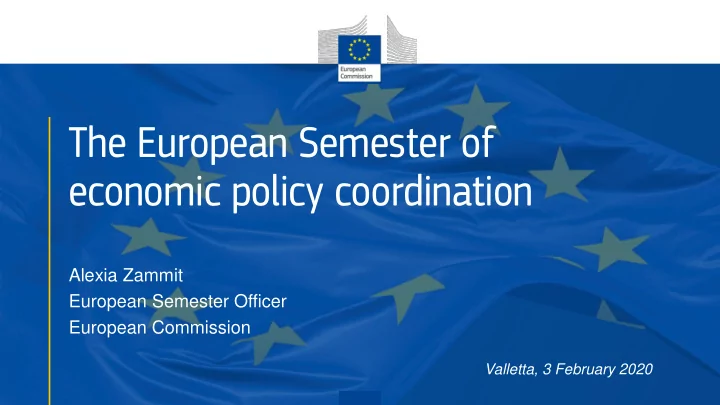

The European Semester of economic policy coordination Alexia Zammit European Semester Officer European Commission Valletta, 3 February 2020
The European Semester The priorities for the upcoming cycle Future collaboration
The original design of the EMU was incomplete • Failure to adapt to requirements of EMU Accumulation of unsustainable debt levels , both in public and private sector Excessive risk-taking in the banking sector Failing market discipline Member States delayed necessary structural reforms • Inadequate governance framework Insufficient monitoring and enforcement tools to safeguard fiscal discipline No established sovereign-debt crisis resolution mechanism for euro-area Member States No integrated European supervisory and regulatory architecture for financial institutions No instruments available to address macroeconomic imbalances
The European Semester: rationale and basic points • The European Semester is the EU’s annual integrated surveillance cycle for fiscal and macro-economic policies. • In the presence of cross-border spill-overs , economic policies are a matter of shared concern. • Since Maastricht, the EU has acquired a "coordinating competence" , which extends to economic, employment and social policies of the Member States. • Specific procedures for dealing with fiscal policies (SGP) and macro-economic imbalances (MIP) are integrated into a broader integrated surveillance framework . • The EU’s power of enforcement varies by policy area. • The European Semester is a problem-oriented policy coordination process.
Political and legal framework The European Semester Country-specific recommendations after analysis of challenges, national reform plans and progress towards the Europe 2020 strategy Stability and Growth Pact Macroeconomic Imbalances Procedure regulation Preventive: Preventive: Recommendations Recommendations Corrective : Corrective : Excessive deficit procedure Excessive imbalances procedure
Key policy areas Public Finances Labour Education Social Financial and Taxation Market and Skills Inclusion Sector Governance and Single Market and Environmental Productivity and Business Sectoral Sustainability Innovation Environment Performance
The Annual Coordination Cycle November Autumn Winter Interim Forecast Forecast Annual Growth Survey Alert Mechanism Report February Euro Area Recommendations Country Opinions on Draft Budgetary Plans Reports April 15 October Draft Budgetary Plans Stability/convergence programmes (EA Member States only) National Reform Programmes Country-specific Summer Interim recommendations Forecast Spring Forecast May/June Submitted by Member States Adopted at EU level
Involvement of other EU institutions and Member States
The main Semester channels for dialogue and interaction Formal written exchanges Formal and informal discussions Between Commission and Member State From the EU to the Member States • Bilateral meetings with Member State • Opinions on Draft Budgetary Plans (for EA MS) authorities • Decisions under the Stability and Growth Pact • Fact-finding missions to the Member States • Country Reports/Enhanced surveillance • European Semester Officer discussions with reports/Specific Monitoring Reports stakeholders • Assessment of the Stability/Convergence • In-depth country team sessions with national Programmes experts • Country-Specific Recommendations • Political Semester Missions to the Member From the Member States to the EU States • Reporting tables In a multilateral setting • National Reform Programmes • Council Committee discussion (EFC, EPC, • Stability or Convergence programmes EMCO and SPC) • Draft Budgetary Plans (for EA MS) • Council Discussions
Semester as essential channel for internal dialogue and interaction European Semester country teams Impact of the Semester teams The Semester country teams have become an Within the European Commission, a country essential process for: team exists for each Member State • These teams are chaired by the Secretariat- General • Better understanding the specific conditions • The teams prepare the contributions for the and challenges in each Member State country reports • DG ECFIN is pen-holder for the country reports • Thinking across organisational silos: all DGs • The teams consist of all Directorates-General are a member of all country teams that are interested (usually around 20) • In each capital, there are 1-2 European Semester Officers who report to the country teams
The European Semester The priorities for the upcoming cycle Future collaboration
The evolving nature of the European Semester Integration of the Social Pillar Juncker Commission 1st European Semester Strengthened link with Cohesion Policy Virtuous triangle Enhanced focus on Investment Link with Cohesion Policy 2011 2014 2017 2018 2019 A New Economic Narrative focussing on four broad and interrelated policy objectives… • Environmental Sustainability • Fairness and Equal Opportunities • Productivity and Competitiveness • Stability and Resilience … and which integrates the UN’s Sustainable Development Goals in the Economic Governance Framework
Integration of the Sustainable Development Goals “ I will refocus the European Semester into an instrument that integrates the United Nations Sustainable Development Goals”
Integration of the Sustainable Development Goals The 17 Goals and 167 targets to be achieved by 2030 are universal (all countries) and indivisible (interlinked)
Environmental sustainability in the Semester ‘Environmental sustainability’ is about how environment contributes to economic and social development, and the other way around. In the Semester, this could include: Economic development implications related to environmental problems Issues related to the performance of related network industries Employment and social impacts of environmental challenges and policies Efficiency gains in resource use (e.g. through circular economy); effects on import dependency/vulnerability; impacts on productivity, competitiveness and trade Identification and, where possible, quantification of investment needs linked to tackling environmental challenges Financing and budgetary constraints Internalisation of environmental costs through fiscal and/or other policies Political Guidelines : The Green Deal (and its financing)
Social Considerations in the Semester (1)
Social Considerations in the Semester (2) Political Guidelines: European Pillar of Social Rights Action Plan
The European Semester The priorities for the upcoming cycle Future collaboration
Current interaction • Meetings • Fact-finding mission (November) • Presentation of Country Report (March) • Request for written feedback • Publication of Autumn Package (November) • Publication of Country Report (February) • Publication of Country-Specific Recommendations (May)
How can we improve things? • Greater presence at MCESD for discussions pertaining to the European Semester; • Video-Conference links with country team members in Brussels to discuss specific files; • Study visit to Brussels on the European Semester; • Channel my communication through MCESD secretariat; • Anything else?
Thank you
Recommend
More recommend